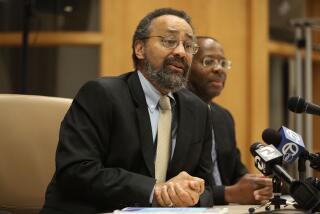Setback may have set Kagan on course for Supreme Court
- Share via
Reporting from Washington — — The first four decades of Elena Kagan’s life had been a chain of success, from her student days at Princeton, Oxford and Harvard to her turns as Supreme Court clerk, law school professor and presidential advisor.
Then, on the brink of her 40th birthday, came a setback.
As she prepared to leave the Clinton White House in 1999, she wanted to return to teaching law at the University of Chicago, where she had won tenure four years earlier. But since she had given up the tenured spot by staying in Washington so long, she needed a faculty vote to approve her return.
The job offer never came.
The criticism leveled against her at the time echoes the knock on her now as she prepares for Senate hearings on her nomination to the Supreme Court: Her volume of scholarly writing is thin.
The setback proved temporary. Kagan took a visiting position at Harvard Law School and quickly rose to become dean. Similarly, the current criticism is unlikely to amount to anything more than grist for some Senate questions before the confirmation vote. But the incident illustrates something about Kagan and the law: She is far less a theorist than she is a practitioner and problem solver.
“She’s just not a natural academic, period,” said Richard A. Epstein, a prominent libertarian and longtime professor at the University of Chicago. “She is a natural lawyer, and a facilitator, and a dean.”
“She turned out to be truly great at what she did,” said David Strauss, a University of Chicago law professor and one of Kagan’s closest friends on the faculty. If things had gone as she had planned at the time, he said, “maybe she wouldn’t be where she is now.”
From the beginning of her time at the university in 1991, colleagues questioned whether Kagan would plunge into the research and publishing that is so important at the school. She joined the faculty about the same time as Barack Obama, though unlike him she was on a track toward tenure.
She did publish several articles and won tenure in 1995, and she was even chosen by students as teacher of the year. But few at the school were surprised when she left to join the office of legal counsel in the Clinton White House.
As fellow West Wing veterans tell it, she quickly became an aide President Clinton would pull aside for hallway conversations about his legislative initiatives on Capitol Hill.
When Kagan decided it was time to return to the university, a group of faculty members weren’t convinced that she was devoted to academia and planned to spend her career there, recalls Geoffrey Stone, who was provost of the law school at the time and who enthusiastically supported her reappointment.
There was no vote to reject her, but there was no offer either.
“She was very disappointed,” Stone said. “She’d gone from being an advisor to the president to being basically unemployed — at least for the moment.”
In any case, Kagan went to Harvard, starting a chapter of her personal story that has been well told over the last few weeks. She published some articles, taught well and rose to dean. The faculty grew and the school flourished under her leadership.
Though she appears to have had only casual contact with Obama at Chicago, the professional friendship blossomed after she landed at Harvard. He was an up-and-coming Democrat and she was a fellow professor from Chicago with a contacts file full of Harvard Law School alums.
Looking back on the episode, Chicago professors say things turned out as they should have.
“Her papers were well done, but they show exactly the same qualities of mind that prevent you from reaching the top ranks in academia,” Epstein said. Devoted scholars love to “take a small problem, make it smaller, break it into pieces, see if it will fit back together.”
“She is good at advising people, fixing things, putting programs in place,” he said.
With the latest turn of events, professors around the Chicago campus joke about their failure to hang on to a faculty member who would become such a viable candidate for the high court.
In retrospect, Stone thinks it was “admirable” what the Chicago faculty did, keeping its focus on scholarship even though it was clear Kagan would probably end up in the corridors of power one day.
“The amazing part is her resilience,” Stone said. “I don’t think this story is about failure. I think it’s about finding one’s niche.”
More to Read
Sign up for Essential California
The most important California stories and recommendations in your inbox every morning.
You may occasionally receive promotional content from the Los Angeles Times.














